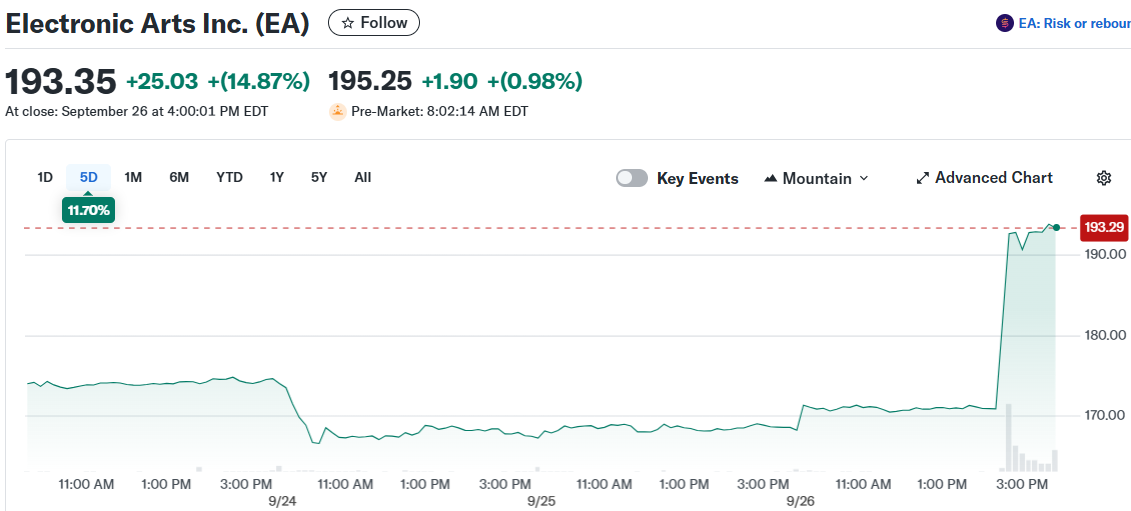TLDR
- Electronic Arts will go private in a record $55 billion leveraged buyout by Silver Lake, Saudi Arabia’s Public Investment Fund, and Jared Kushner’s Affinity Partners
- Shareholders will receive $210 per share in cash, representing a 25% premium over the September 25 closing price
- The deal would be the largest leveraged buyout on record, surpassing TXU Energy’s 2007 transaction
- Transaction expected to close in Q1 fiscal year 2027, pending shareholder and regulatory approval
- EA must pay $1 billion termination fee if deal falls through under certain conditions
Electronic Arts announced Monday it has agreed to be taken private in a massive $55 billion leveraged buyout. The deal brings together an unusual consortium of buyers including private equity firm Silver Lake, Saudi Arabia’s Public Investment Fund, and Affinity Partners, the firm led by Jared Kushner.

The transaction would set a new record for the largest leveraged buyout in history. It surpasses the previous record held by TXU Energy’s 2007 takeover and other landmark deals from that era including Toys “R” Us and Hertz.
Under the agreement, EA shareholders will receive $210 per share in cash. This represents a 25% premium over the company’s closing price on September 25, before reports of the potential deal first emerged.
The deal carries an equity value of $52.54 billion according to Reuters calculations. Electronic Arts said the transaction involves around $36 billion in equity investment and $20 billion in debt financing committed by JPMorgan.
Of the debt financing, $18 billion is expected to be funded when the transaction closes. The funding will come from a combination of cash from the consortium members and a rollover of the Public Investment Fund’s existing stake in EA.
The timing comes as the gaming industry shows signs of recovery from a prolonged downturn. Deep-pocketed investors are betting on the lasting value of major game franchises as the sector stabilizes.
For EA specifically, the company is banking heavily on its core sports portfolio and action shooter properties. The publisher is preparing to launch the highly anticipated “Battlefield 6” title in an environment where gamers increasingly stick to proven franchises.
EA’s sports games have provided consistent revenue for over a decade. The global popularity of these titles generates strong recurring income through in-game spending patterns that have proven durable over time.
Deal Structure and Timeline
The complex financing structure reflects the scale of the transaction. JPMorgan has committed to provide the $20 billion debt package that will help fund the acquisition alongside the equity contributions.
The transaction is expected to close in the first quarter of fiscal year 2027. This timeline allows for the necessary shareholder votes and regulatory approvals that deals of this size typically require.
Both sides face financial penalties if the deal falls apart under certain conditions. EA must pay a $1 billion termination fee if it backs out due to a board reversal, accepts a higher competing bid, or pursues another deal within a year of shareholders rejecting this offer.
The consortium faces the same $1 billion penalty if regulatory delays push completion past September 28, 2026, or if they breach the merger agreement. These fees are designed to keep both parties committed to completing the transaction.
Analyst Perspectives
Some analysts question whether the $210 per share offer fully captures EA’s potential value. Benchmark analysts noted that while the price “may appear compelling,” they believe it “falls materially short of the company’s intrinsic value.”
They pointed to the upcoming Battlefield 6 launch and a development pipeline that could generate more than $2 billion in additional bookings by fiscal year 2028. This suggests EA’s “true earnings power is only beginning to emerge” in their view.
The deal comes as global dealmaking activity rebounds thanks to easing borrowing costs. This environment has revived investor appetite for large-scale transactions that were largely absent during the higher interest rate period.
The transaction involves a rollover of the Public Investment Fund’s existing stake in EA, indicating the Saudi sovereign wealth fund was already an investor in the gaming company before agreeing to participate in taking it private.





